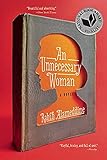
1.
Last year at a conference in Los Angeles, Rabih Alameddine participated in a delightfully contentious panel on politics and literary fiction. When asked why he chose to write a political novel — he was there to talk about his brilliant fifth book, An Unnecessary Woman — he said, “I cannot imagine writing a novel that is not political. I am a political being. A human is a political being. You must have to be very privileged to think you could write an apolitical novel.” By “you,” I took him to mean Americans, who made up much of the audience in that conference room.
 An Unnecessary Woman was political in two ways — dealing with the civil war in Beirut, as well as with the plight of women in a male-centric society. Alameddine’s new book, The Angel of History, is a novel about the myriad disasters that have marked the life of its gay, half-Yemeni, half-Lebanese narrator, Jacob. The AIDS epidemic once killed all six of his best friends, including his live-in partner “Doc,” in one fell swoop; now, he wakes up every morning to news of drone strikes killing citizens of his home country, Yemen.
An Unnecessary Woman was political in two ways — dealing with the civil war in Beirut, as well as with the plight of women in a male-centric society. Alameddine’s new book, The Angel of History, is a novel about the myriad disasters that have marked the life of its gay, half-Yemeni, half-Lebanese narrator, Jacob. The AIDS epidemic once killed all six of his best friends, including his live-in partner “Doc,” in one fell swoop; now, he wakes up every morning to news of drone strikes killing citizens of his home country, Yemen.
Bereavement is the most personal of catastrophes, but when the world seems to care nothing for the person lost — because he or she is gay (deemed a sinner) or Arab (deemed a terrorist) — isn’t it also the most political?
2.
Jacob spends most of the novel sitting in the waiting room of a psychiatric emergency clinic, hoping to get admitted for 72 hours of rest after having (to speak non-clinically) a meltdown at work earlier that day.
While he spins out his erudite stream-of-consciousness narrative in the hospital, back in his apartment a battle is waged, literally, for his soul. Satan (yes, that one) is busy conducting interviews with Death and with the 14 angels who have watched over Jacob for much of his itinerant life, hoping to awaken Jacob’s memories of his past: a life of drugs, dungeons, sex, and poetry that ended when his friends died.
Of course, Alameddine is not the kind of writer who would actually portray drugs and kink, or Satan himself for that matter, as evil. Satan and Death could easily make for very heavy-handed, or at least awkwardly earnest, characters. But in these incarnations they’re suavely funny and combative, and they mostly escape the danger of becoming painful clichés. These are not Biblical characters, but literary ones; Alameddine sprinkles his playfully allusive text liberally with references to Paradise Lost. Jacob speaks of himself often as “hurled headlong flaming from th’ ethereal sky,” as John Milton wrote of Satan. Milton’s Satan refused to serve God; Alameddine’s Satan is also frequently referred to as Iblis, the angel who in Islamic lore once refused to kneel to Adam.
Jacob’s rather tepid goal is to rest, so Satan carries the real drama of the novel: the battle of memory versus oblivion. The literary Satan is a rebel; and memory in this novel is a kind of rebellion.
3.
Like Rip van Winkle, Jacob has just woken up from a 20-year nap, not of unconsciousness but of oblivion, which he’s enjoyed ever since Doc died. Unlike Rip, it wasn’t Jacob who was forgotten in those 20 years, but his friends — and the painful history of the AIDS crisis. (How perfect that Jacob lives in San Francisco, because if any city is experiencing a particular oppressive form of oblivion, it’s the rapidly gentrifying, tech-booming San Francisco.)
His first awakening comes early in the book, in a flashback to a recent encounter with a young gay literary type who waxes dramatic about the loss suffered by Joan Didion. Jacob rages at the young man for caring about Joan Didion when she did not care for them.
But the guilt isn’t just Joan’s; it’s Jacob’s too. To Doc, in his journal, he writes an agonized plea. “I put it aside for a while, forgive me. I couldn’t go on, had to move forward, couldn’t bear the burden of remembering and couldn’t come to terms with the unbearable.”
His pleas for forgiveness — not only to Doc, but to his mother, the woman he left behind in an Egyptian brothel to pursue an education under the patronage of his wealthy father and the privilege of his own maleness and lighter skin — are the heartbreaking emotional core of the book. But they also remind us that everyone is complicit in the structure that consigns certain people’s sufferings to oblivion.
4.
There’s nothing specific that Satan wants Jacob to remember, to bring him to an epiphany. “That happens only in Hollywood movies and bestsellers. It isn’t how remembering works,” Satan says.
It might seem unnecessary for such an unconventional, meandering narrative to bother unsubtly distinguishing itself from bestsellers and Hollywood dramas. But this is the promise of the book: that the prize Satan hopes to win from making Jacob remember will be something more significant than a navel-gazing epiphany.
 Novels about memory often end with a bang: some abuse or crime, a sordid secret or unconfessed love. Even highly literary novels — think of Margaret Atwood’s The Blind Assassin, for example — tend to fall in line, providing a neat epiphany to make the flashbacks pay off. We still want climactic resolution from our novels, literary or not, and The Angel of History doesn’t even make a pro forma attempt to build the kind of narrative tension that could ever lead to that satisfaction.
Novels about memory often end with a bang: some abuse or crime, a sordid secret or unconfessed love. Even highly literary novels — think of Margaret Atwood’s The Blind Assassin, for example — tend to fall in line, providing a neat epiphany to make the flashbacks pay off. We still want climactic resolution from our novels, literary or not, and The Angel of History doesn’t even make a pro forma attempt to build the kind of narrative tension that could ever lead to that satisfaction.
In fact, knowing that Jacob’s not headed for the big epiphany, it’s easy to wonder why you’re reading this meandering novel to begin with. In many ways, it’s not even exciting to read. It’s erudite, discursive, dense; the story of Jacob’s bereavement, and of his lonely childhood in exile, is spun out languidly, interspersed with his long stint in the waiting room (the plotlessness inherent in that concept is obvious), Jacob’s own darkly witty short stories, and Satan’s mordantly humorous interviews. It can make for a hard read, with rewards more intellectual than emotional (although Jacob’s grief and remorse are deeply felt and intensely moving).
But this novel doesn’t need to have an exciting plot, shouldn’t have an exciting plot, because that would distract from the important work that needs to be done, both by Jacob and by the readers: to remember the dead.
5.
Jacob compares himself to the angel of history — Walter Benjamin’s concept of an angel who sees history as “one single catastrophe which keeps piling wreckage upon wreckage.” His dead friends who were erased by the “grand elision” of queer history are not a separate catastrophe from the Yemenis who die each day in “cataracts of fire…while [God’s] privileged practice yoga asana.”
Though he may feel he’s betrayed his loved ones, Jacob is deeply compassionate, almost too compassionate by conventional American standards of self-sufficiency and emotional robustness. After befriending a goat as a lonely child, Jacob gives up meat forever when the goat is slaughtered, though so many other human beings have managed to befriend some animals and consume the meat of others without experiencing too painful a cognitive dissonance.
So too with the drone strikes, which many Americans may find deplorable, but not so upsetting that it interferes with their day-to-day lives. Jacob, on the other hand, experiences each strike with raw grief, and his current mental distress is at least partially due to the strikes. He was recently upset by the news of one in Yemen that supposedly killed several terrorists — but then, he points out drily, “Yemenis were always that.” (Several of Jacob’s stories are blistering satires of Western Islamophobia, some more successful than others.)
This presents us as readers, perhaps especially but not only American readers, with an insistent, reproachful question. How can we go pleasantly about our days — to the law firm to work, to the steakhouse to eat, past the post office funded by the same government that funds drone strikes, or past the hospital where an epidemic is killing gay men — without, like Jacob, crumpling under the sheer weight of the catastrophe? The answer, of course, is forgetfulness — the same forgetfulness that Satan wants to shake Jacob out of. Oblivion allows some lives to be forgotten while others proceed in pleasant calm. It allows oppression, in other words, to go on.
This novel is not just the story of Jacob’s awakening. It’s a fierce, unapologetic wake-up call to everyone who, like Jacob, lives as “a productive member of a comatose society.”








